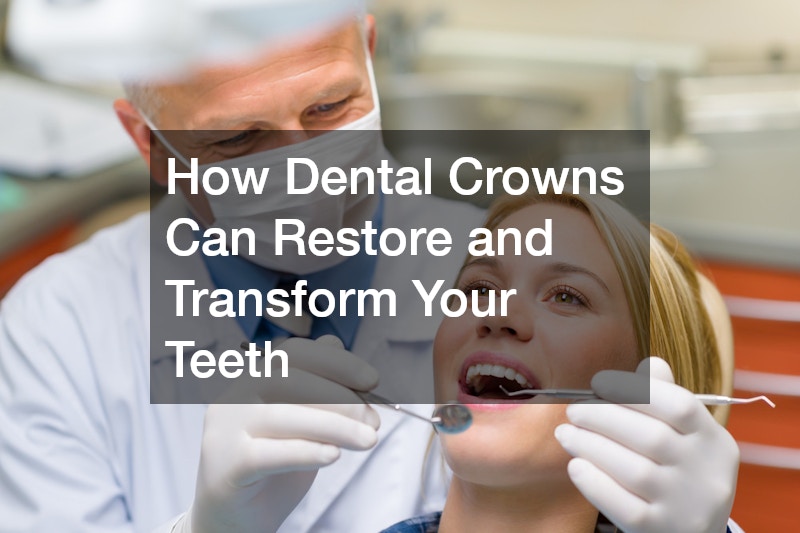
If you’ve ever cracked a tooth, experienced severe decay, or had a root canal, your dentist may have mentioned dental crowns as a treatment option. A dental crown, often called a “cap,” is one of the most effective ways to restore the function, appearance, and strength of a damaged tooth. These durable restorations have helped millions of people regain their confidence and maintain healthy smiles for years.
What Are Dental Crowns?
A dental crown is a custom-made cover placed over a tooth to protect it and restore its shape and strength. Crowns are designed to look and feel just like your natural teeth.
They can be made from several materials, including porcelain, ceramic, metal, or zirconia, depending on your needs and preferences.
Dentists often recommend dental crowns when a tooth is too weak for a filling but doesn’t need to be extracted. Crowns provide long-lasting protection while restoring your bite and smile.
When You Might Need a Dental Crown
Dental crowns are incredibly versatile. Your dentist may recommend one if you have:
- A tooth weakened by decay or a large filling
- A cracked, chipped, or broken tooth
- A tooth that has undergone a root canal treatment
- A dental implant that needs a restoration
- Discolored or misshapen teeth that affect your smile
- A bridge that requires support from nearby teeth
In short, crowns can solve both cosmetic and functional problems, making them one of the most common and effective dental treatments.
Types of Dental Crowns
There are several types of dental crowns, each offering unique advantages depending on your goals, budget, and the tooth’s location.
1. Porcelain and Ceramic Crowns
These crowns are popular for their natural appearance. They’re often used for front teeth because they closely match the color and translucency of real enamel.
2. Porcelain-Fused-to-Metal (PFM) Crowns
PFM crowns combine the natural look of porcelain with the strength of a metal base. They are durable and suitable for both front and back teeth.
3. All-Metal Crowns
Made from gold or other metal alloys, these crowns are extremely strong and long-lasting. They’re ideal for molars that handle heavy chewing but are less common for visible teeth due to their metallic color.
4. Zirconia Crowns
Zirconia crowns are known for being both tough and beautiful. They resist chipping, can be color-matched to your natural teeth, and are often available as same-day restorations using digital technology.
The Dental Crown Procedure
Getting a dental crown usually takes two visits, though some offices offer same-day crowns using CAD/CAM technology.
Step 1: Consultation and Preparation
During your first visit, your dentist examines the affected tooth and takes X-rays to determine the best treatment. The tooth is then reshaped to make room for the crown. Afterward, your dentist takes an impression or digital scan of the tooth to create your custom crown. A temporary crown is placed to protect the tooth while the permanent one is being made.
Step 2: Crown Placement
Once your permanent crown is ready, your dentist removes the temporary one and checks the new crown’s color, fit, and comfort. After adjustments, the crown is cemented into place, restoring your tooth’s strength and appearance.
Benefits of Dental Crowns
There’s a reason dental crowns are one of the most trusted restorative treatments. They offer:
- Strength and durability: Crowns reinforce weak teeth and withstand daily use.
- Natural look: They blend seamlessly with surrounding teeth for a beautiful smile.
- Comfortable fit: Custom design ensures they feel just like your natural teeth.
- Protection: They prevent further decay or damage to the tooth underneath.
- Long-lasting results: With good care, crowns can last 10–15 years or more.
Caring for Your Dental Crowns
Taking care of your crowns is simple—treat them like your natural teeth. Follow these tips for long-lasting results:
- Brush twice daily with a fluoride toothpaste.
- Floss gently around the crown to remove plaque.
- Avoid biting hard foods, ice, or non-food items.
- Visit your dentist regularly for cleanings and checkups.
- If you grind your teeth, wear a nightguard to protect your crowns.
With proper care, your dental crowns can remain strong and beautiful for many years.
Same-Day Crowns: A Modern Option
Many dental offices now offer same-day crowns using advanced digital scanning and milling technology. Instead of waiting weeks for a lab-made crown, your dentist can design, create, and place your crown in a single appointment. Same-day dental crowns are just as durable and natural-looking as traditional ones, offering convenience without compromise.
How Much Do Dental Crowns Cost?
The cost of dental crowns varies based on materials and the complexity of your case. On average, crowns range from $900 to $2,500 per tooth. Some dental insurance plans cover part of the cost if the crown is medically necessary. Your dentist may also offer financing options to make treatment more affordable.
The Bottom Line
If you have a damaged or weakened tooth, dental crowns can give you back your confidence and restore your oral health. Crowns not only protect your teeth but also enhance your smile, offering strength, beauty, and function for years to come.
Whether you need one crown or several, your dentist can help you choose the right type and ensure a comfortable, natural-looking fit. Don’t let a damaged tooth hold you back—schedule a consultation today and discover how dental crowns can help you smile stronger, brighter, and more confidently than ever.



